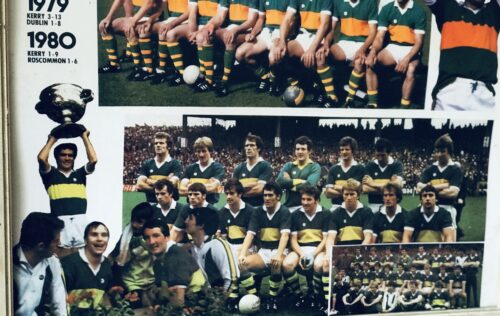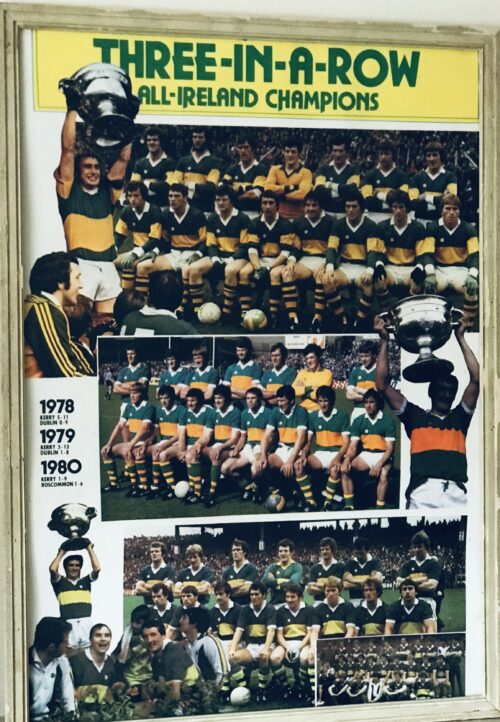-
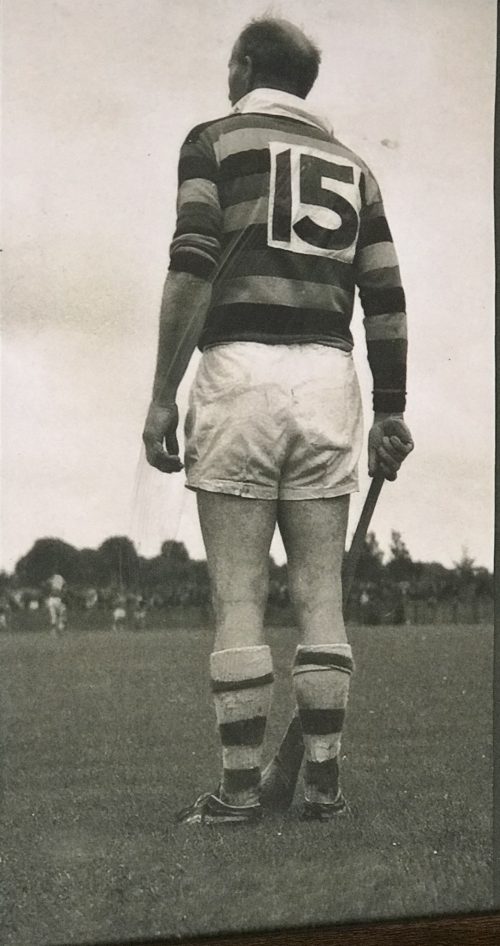
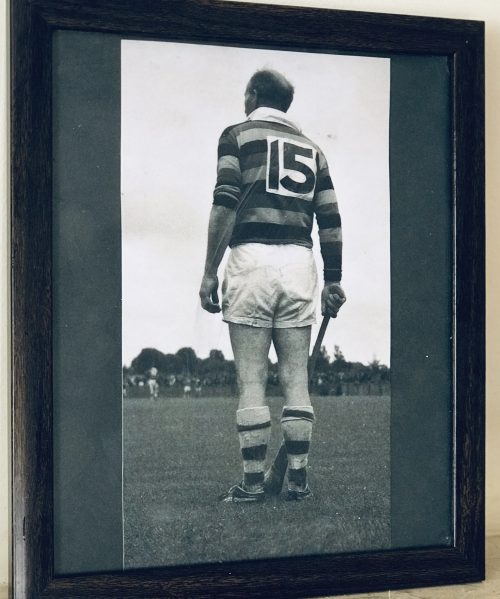 28cm x 34cm. Clonakilty Co Cork Poignant photograph of Christy Ring towards the end of his storied career, in the familiar hoops of his club- Glen Rovers. Nicholas Christopher Michael "Christy" Ring (30 October 1920 – 2 March 1979) was an Irish hurler whose league and championship career with the Cork senior team spanned twenty-four years from 1939 to 1963. He established many championship records, including career appearances (65), scoring tally (33-208) and number of All-Ireland medals won (8), however, these records were subsequently bested by Brendan Cummins, Eddie Keher and Henry Shefflin respectively.Ring is widely regarded as the greatest hurler in the history of the game, with many former players, commentators and fans rating him as the number one player of all time. Born in Cloyne, County Cork, Ring first played competitive hurling following encouragement from his local national school teachers Michael O'Brien and Jerry Moynihan. He first appeared on the Cloyne minor team at the age of twelve before later winning a county minor championship medal with the nearby St Enda'steam. A county junior championship medal with Cloyne followed, however, a dispute with club officials saw Ring join Glen Rovers in Blackpool in 1941. Over the next twenty-six years with the club, Ring won one Munster medal and fourteen county senior championship medals. As a Gaelic footballer with the Glen's sister club, St. Nicholas', he also won a county senior championship medal. He retired from club hurling at the age of forty-six following a victory over University College Cork in the 1967 championship quarter-final. Over the course of his senior championship career Ring estimated that he played in 1,200 games. Ring made his debut on the inter-county scene at the age of sixteen when he was picked on the Cork minor panel for the All-Ireland final. In spite of victory, he was denied an All-Ireland medal as he was Cork's last non-playing substitute. Still eligible for the grade in 1938, Ring collected a set of All-Ireland and Munster medals as a member of the starting fifteen. An unsuccessful year with the Cork junior hurlers followed before he made his senior debut during the 1939-40 league. Over the course of the next quarter of a century, Ring won eight All-Ireland medals, including a record four championships in-a-row from 1941 to 1944, a lone triumph in 1946 and three championships in-a-row from 1952 to 1954. The only player to lift the Liam MacCarthy Cup three times as captain, he was denied a record-breaking ninth All-Ireland medal in 1956 in what was his last All-Ireland final appearance. Ring also won nine Munster medals, four National Hurling League medals and was named Hurler of the Year at the age of thirty-eight. He played his last game for Cork in June 1963. After indicating his willingness to line out for the team once again in 1964, Ring failed to be selected for the Cork team, a move which effectively brought his inter-county career to an end. After being chosen as a substitute on the Munster inter-provincial team in 1941, Ring was an automatic choice on the starting fifteen for the following twenty-two years. He scored 42-105 as he won a record eighteen Railway Cup medals during that period, in an era when his skill and prowess drew crowds of up to 50,000 to Croke Park for the annual final on St. Patrick's Day. Ring's retirement from the game is often cited as a contributory factor in the decline of the championship. In retirement from playing Ring became involved in team management and coaching. As a mentor to the St. Finbarr's College senior team, he guided them to their first two All-Ireland and Harty Cup triumphs in 1963 and 1969. At club level Ring was instrumental as a selector with Glen Rovers when they claimed their inaugural All-Ireland title in 1973, having earlier annexed the Munster and county senior championship titles. It was with the Cork senior team that he enjoyed his greatest successes as a selector. After an unsuccessful campaign in his first season on the selection panel in 1973, Ring was dropped the following year before being reinstated in 1975. Over the next three years Cork claimed three successive All-Ireland titles. Ring was most famous for his scoring prowess, physical strength and career longevity. He remains the only player to have competed at inter-county level in four different decades. Often the target of public attention for his hurling exploits, in private Ring was a shy and reserved individual. A teetotaller and non-smoker throughout his life, he was also a devout Roman Catholic. Ring's sudden death in March 1979 and the scenes which followed at his funeral were unprecedented in Cork since the death of the martyred Lord Mayor Tomás Mac Curtain in 1920. He was posthumously honoured by being named on the Hurling Team of the Century in 1984 and the Hurling Team of the Millennium in 2000, while he was also named as the Century's Best Hurler in the Irish Times.
28cm x 34cm. Clonakilty Co Cork Poignant photograph of Christy Ring towards the end of his storied career, in the familiar hoops of his club- Glen Rovers. Nicholas Christopher Michael "Christy" Ring (30 October 1920 – 2 March 1979) was an Irish hurler whose league and championship career with the Cork senior team spanned twenty-four years from 1939 to 1963. He established many championship records, including career appearances (65), scoring tally (33-208) and number of All-Ireland medals won (8), however, these records were subsequently bested by Brendan Cummins, Eddie Keher and Henry Shefflin respectively.Ring is widely regarded as the greatest hurler in the history of the game, with many former players, commentators and fans rating him as the number one player of all time. Born in Cloyne, County Cork, Ring first played competitive hurling following encouragement from his local national school teachers Michael O'Brien and Jerry Moynihan. He first appeared on the Cloyne minor team at the age of twelve before later winning a county minor championship medal with the nearby St Enda'steam. A county junior championship medal with Cloyne followed, however, a dispute with club officials saw Ring join Glen Rovers in Blackpool in 1941. Over the next twenty-six years with the club, Ring won one Munster medal and fourteen county senior championship medals. As a Gaelic footballer with the Glen's sister club, St. Nicholas', he also won a county senior championship medal. He retired from club hurling at the age of forty-six following a victory over University College Cork in the 1967 championship quarter-final. Over the course of his senior championship career Ring estimated that he played in 1,200 games. Ring made his debut on the inter-county scene at the age of sixteen when he was picked on the Cork minor panel for the All-Ireland final. In spite of victory, he was denied an All-Ireland medal as he was Cork's last non-playing substitute. Still eligible for the grade in 1938, Ring collected a set of All-Ireland and Munster medals as a member of the starting fifteen. An unsuccessful year with the Cork junior hurlers followed before he made his senior debut during the 1939-40 league. Over the course of the next quarter of a century, Ring won eight All-Ireland medals, including a record four championships in-a-row from 1941 to 1944, a lone triumph in 1946 and three championships in-a-row from 1952 to 1954. The only player to lift the Liam MacCarthy Cup three times as captain, he was denied a record-breaking ninth All-Ireland medal in 1956 in what was his last All-Ireland final appearance. Ring also won nine Munster medals, four National Hurling League medals and was named Hurler of the Year at the age of thirty-eight. He played his last game for Cork in June 1963. After indicating his willingness to line out for the team once again in 1964, Ring failed to be selected for the Cork team, a move which effectively brought his inter-county career to an end. After being chosen as a substitute on the Munster inter-provincial team in 1941, Ring was an automatic choice on the starting fifteen for the following twenty-two years. He scored 42-105 as he won a record eighteen Railway Cup medals during that period, in an era when his skill and prowess drew crowds of up to 50,000 to Croke Park for the annual final on St. Patrick's Day. Ring's retirement from the game is often cited as a contributory factor in the decline of the championship. In retirement from playing Ring became involved in team management and coaching. As a mentor to the St. Finbarr's College senior team, he guided them to their first two All-Ireland and Harty Cup triumphs in 1963 and 1969. At club level Ring was instrumental as a selector with Glen Rovers when they claimed their inaugural All-Ireland title in 1973, having earlier annexed the Munster and county senior championship titles. It was with the Cork senior team that he enjoyed his greatest successes as a selector. After an unsuccessful campaign in his first season on the selection panel in 1973, Ring was dropped the following year before being reinstated in 1975. Over the next three years Cork claimed three successive All-Ireland titles. Ring was most famous for his scoring prowess, physical strength and career longevity. He remains the only player to have competed at inter-county level in four different decades. Often the target of public attention for his hurling exploits, in private Ring was a shy and reserved individual. A teetotaller and non-smoker throughout his life, he was also a devout Roman Catholic. Ring's sudden death in March 1979 and the scenes which followed at his funeral were unprecedented in Cork since the death of the martyred Lord Mayor Tomás Mac Curtain in 1920. He was posthumously honoured by being named on the Hurling Team of the Century in 1984 and the Hurling Team of the Millennium in 2000, while he was also named as the Century's Best Hurler in the Irish Times. -

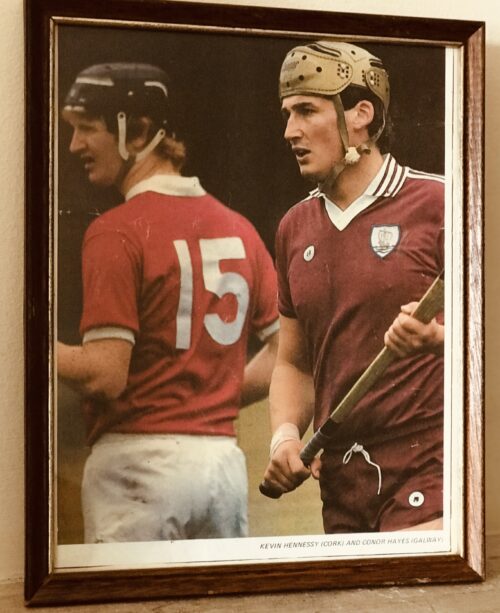 Real retro GAA hurling photo here of Kevin Hennessy of Cork & Conor Hayes of Galway marking each other in an All Ireland Final.Conor is wearing what appears to be a very old Cooper Ice hockey Head guard and it became his signature piece during his career as Galway Captain and Full Back. Kiltormer Co Galway 29cm x 23cm Conor Hayes was a three-time All-Star. He made his debut for the Galway senior hurlers during the 1979 championship and went on to play a key role for the Tribesmen for over a decade, winning three All-Irelands and two National Leagues. He was captain when Galway won back-to-back All-Ireland titles in 1987 and 1988. Conor is also an All-Ireland winner at club level, having achieved the highest honour in club hurling with Kiltormer in 1992. He is the holder of two Connacht club championships and three Galway hurling championships with Kiltormer and was named on the Galway Hurling Team of the Millennium. Kevin Hennessy (born 8 March 1961) is an Irish retired hurler who played as a left-corner forward for the Cork senior team. Born in Midleton, County Cork, Hennessy first arrived on the inter-county scene at the age of 18 when he first linked up with the Cork minor team, before later lining out with the under-21 side. He made his senior debut in the 1982 championship. Hennessy went on to play a key part for over a decade, and won three All-Ireland medals and seven Munster medals. He was an All-Ireland runner-up on three occasions. Hennessy represented the Munster inter-provincial team in the early stages of his career, winning two Railway Cup medals. At club level he won one All-Ireland medal, two Munster medals and four championship medals with Midleton. Throughout his career Hennessy made 22 championship appearances for Cork. He retired from inter-county hurling following the conclusion of the 1993 championship.
Real retro GAA hurling photo here of Kevin Hennessy of Cork & Conor Hayes of Galway marking each other in an All Ireland Final.Conor is wearing what appears to be a very old Cooper Ice hockey Head guard and it became his signature piece during his career as Galway Captain and Full Back. Kiltormer Co Galway 29cm x 23cm Conor Hayes was a three-time All-Star. He made his debut for the Galway senior hurlers during the 1979 championship and went on to play a key role for the Tribesmen for over a decade, winning three All-Irelands and two National Leagues. He was captain when Galway won back-to-back All-Ireland titles in 1987 and 1988. Conor is also an All-Ireland winner at club level, having achieved the highest honour in club hurling with Kiltormer in 1992. He is the holder of two Connacht club championships and three Galway hurling championships with Kiltormer and was named on the Galway Hurling Team of the Millennium. Kevin Hennessy (born 8 March 1961) is an Irish retired hurler who played as a left-corner forward for the Cork senior team. Born in Midleton, County Cork, Hennessy first arrived on the inter-county scene at the age of 18 when he first linked up with the Cork minor team, before later lining out with the under-21 side. He made his senior debut in the 1982 championship. Hennessy went on to play a key part for over a decade, and won three All-Ireland medals and seven Munster medals. He was an All-Ireland runner-up on three occasions. Hennessy represented the Munster inter-provincial team in the early stages of his career, winning two Railway Cup medals. At club level he won one All-Ireland medal, two Munster medals and four championship medals with Midleton. Throughout his career Hennessy made 22 championship appearances for Cork. He retired from inter-county hurling following the conclusion of the 1993 championship. -
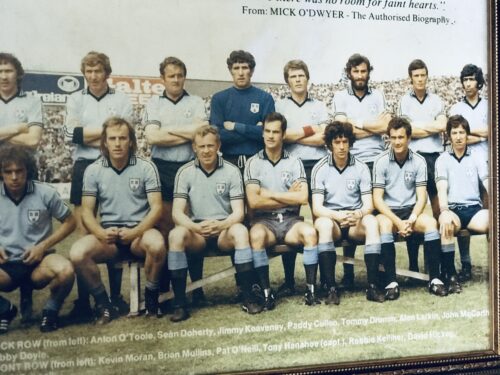
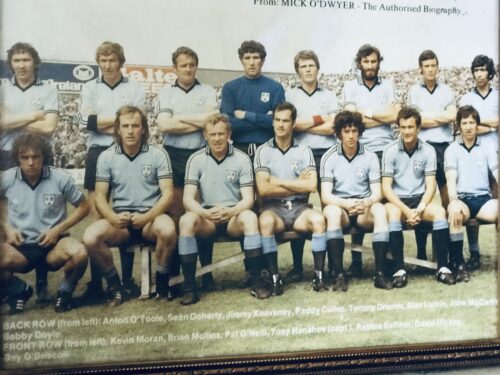 Team photo from before the 1977 All Ireland SemiFinal of that great Dublin side. Dublin 22cm x 27cm here have been many memorable battles between Dublin and Kerry down through the years, but the meeting between the two sides on the 21st of August 1977 has been described many times as the greatest game of all time. The country was gripped by this fierce rivalry that built up through the 70’s. This was the third year in a row that the two sides went toe to toe with both teams up claiming a win each. The game started at a furious pace that didn’t wane for the entire match. Dublin missed a couple of early goal chances and it was Kerry’s Seán Walsh hit the first three pointer to leave a goal between the sides at the break. Dublin though dominated the midfield sector particularly with the second half introduction Bernard Brogan. With the Dubs in the ascendancy early in the second period they took full advantage and a John McCarthy goal leveled the game brought them right back into it. The action flowed from one end of the Croke Park pitch to the other with the sides exchanging a flurry of points. The intensity levels rose dramatically both on the pitch and in the stands as this thriller continued to enthrall and excite throughout. But two late goals clinched it for Kevin Heffernan’s men, Tony Hanahoe gathered a loose ball around the middle, passed it off to David Hickey who strode forward and hit a brilliant shot to the back of the net for Dublin’s second goal. Just before the final whistle the Sky Blues grabbed their third goal, a sweeping move involving David Hickey, Tony Hanahoe and Bobby Doyle seen the ball end up in the hands of Bernard Brogan who unleashed a rocket which almost took the net off the goal and Dublin claimed a well deserved victory.
Team photo from before the 1977 All Ireland SemiFinal of that great Dublin side. Dublin 22cm x 27cm here have been many memorable battles between Dublin and Kerry down through the years, but the meeting between the two sides on the 21st of August 1977 has been described many times as the greatest game of all time. The country was gripped by this fierce rivalry that built up through the 70’s. This was the third year in a row that the two sides went toe to toe with both teams up claiming a win each. The game started at a furious pace that didn’t wane for the entire match. Dublin missed a couple of early goal chances and it was Kerry’s Seán Walsh hit the first three pointer to leave a goal between the sides at the break. Dublin though dominated the midfield sector particularly with the second half introduction Bernard Brogan. With the Dubs in the ascendancy early in the second period they took full advantage and a John McCarthy goal leveled the game brought them right back into it. The action flowed from one end of the Croke Park pitch to the other with the sides exchanging a flurry of points. The intensity levels rose dramatically both on the pitch and in the stands as this thriller continued to enthrall and excite throughout. But two late goals clinched it for Kevin Heffernan’s men, Tony Hanahoe gathered a loose ball around the middle, passed it off to David Hickey who strode forward and hit a brilliant shot to the back of the net for Dublin’s second goal. Just before the final whistle the Sky Blues grabbed their third goal, a sweeping move involving David Hickey, Tony Hanahoe and Bobby Doyle seen the ball end up in the hands of Bernard Brogan who unleashed a rocket which almost took the net off the goal and Dublin claimed a well deserved victory. -
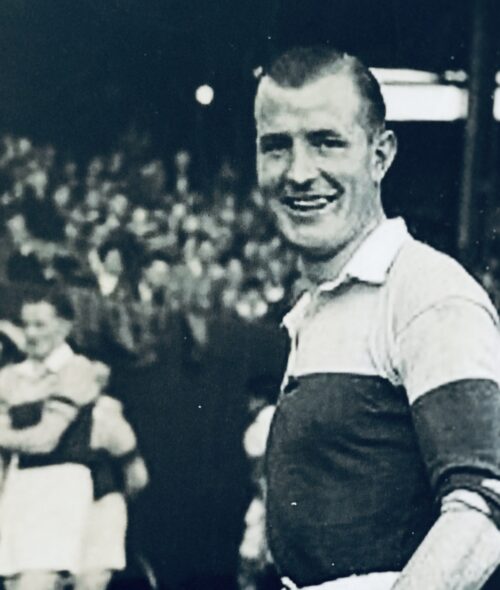
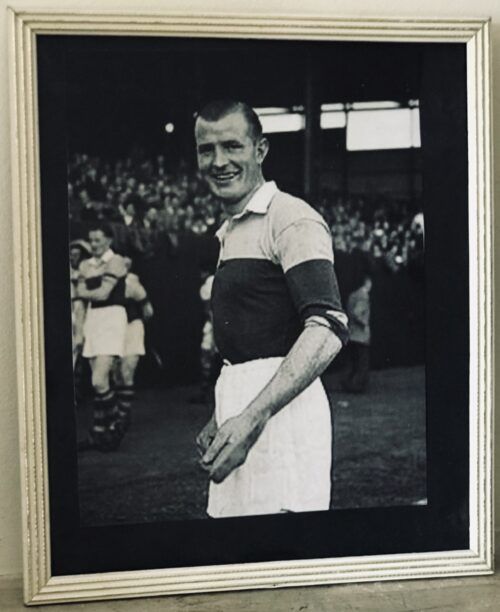 Poignant portrait of all time Wexford Hurling Great Nicky Rackard Enniscorthy Co Wexford 35cm x32cm "I was lucky enough to be on a Wexford team that he was involved with," recalled Liam Griffin. "He put his hand on my shoulder and that was like the hand of God touching you. "He was a fantastic man and his presence was just unbelievable. To see him standing there in a dressing-room, you wouldn't be worried about going out on the pitch, you'd just be looking at him." Despite his many years of service to Wexford GAA, Nicky Rackard's life was cut tragically short and at only the age of 53, the legendary hurler passed on after a battle with cancer. As Liam Griffin recalled on OTB AM, Rackard had also had his struggles with alcohol. "He was a gentleman as well, but look, he had his problems when he wasn't a gentleman as well when he had drink taken like most people," he explained. "But look, he was an inspiration too because he went on to do great work for alcoholics and so forth. "But I'm just going to say this, and I'm not saying this to be smart but because I mean it sincerely. After the All-Ireland final when we won it we put the cup in the middle of the floor the next morning after the All-Ireland. "In my view, he'd had such an influence on me and what we were that we stood around the cup and said a few prayers, and I'm not ashamed to say that I can tell you. "I warned them, and I meant it because I had thought about it in the previous weeks and months before, about any of them becoming an alcoholic, like Nicky Rackard. "He was one of the greatest but hero-worship is dangerous and when they walked out that door their lives would change forever. Nicky's life was spoiled by the worship he received and that's an unintended consequence, but it is the truth." The prominent figure upon Wexford's Mt Rushmore in Liam Griffin's opinion, whatever of Nicky Rackard's troubles in life, Griffin believes his legacy as a hurler is unsurpassed. "He led Wexford when we hadn't fields of barley let me tell you, we had pretty barren fields," he recalled. "Nicky Rackard carried on through a lot of thick and thin with Wexford, through a lot of heartache but he eventually put his flag on the top of the mountain. "He's #1 in Wexford, that's for sure."
Poignant portrait of all time Wexford Hurling Great Nicky Rackard Enniscorthy Co Wexford 35cm x32cm "I was lucky enough to be on a Wexford team that he was involved with," recalled Liam Griffin. "He put his hand on my shoulder and that was like the hand of God touching you. "He was a fantastic man and his presence was just unbelievable. To see him standing there in a dressing-room, you wouldn't be worried about going out on the pitch, you'd just be looking at him." Despite his many years of service to Wexford GAA, Nicky Rackard's life was cut tragically short and at only the age of 53, the legendary hurler passed on after a battle with cancer. As Liam Griffin recalled on OTB AM, Rackard had also had his struggles with alcohol. "He was a gentleman as well, but look, he had his problems when he wasn't a gentleman as well when he had drink taken like most people," he explained. "But look, he was an inspiration too because he went on to do great work for alcoholics and so forth. "But I'm just going to say this, and I'm not saying this to be smart but because I mean it sincerely. After the All-Ireland final when we won it we put the cup in the middle of the floor the next morning after the All-Ireland. "In my view, he'd had such an influence on me and what we were that we stood around the cup and said a few prayers, and I'm not ashamed to say that I can tell you. "I warned them, and I meant it because I had thought about it in the previous weeks and months before, about any of them becoming an alcoholic, like Nicky Rackard. "He was one of the greatest but hero-worship is dangerous and when they walked out that door their lives would change forever. Nicky's life was spoiled by the worship he received and that's an unintended consequence, but it is the truth." The prominent figure upon Wexford's Mt Rushmore in Liam Griffin's opinion, whatever of Nicky Rackard's troubles in life, Griffin believes his legacy as a hurler is unsurpassed. "He led Wexford when we hadn't fields of barley let me tell you, we had pretty barren fields," he recalled. "Nicky Rackard carried on through a lot of thick and thin with Wexford, through a lot of heartache but he eventually put his flag on the top of the mountain. "He's #1 in Wexford, that's for sure." -
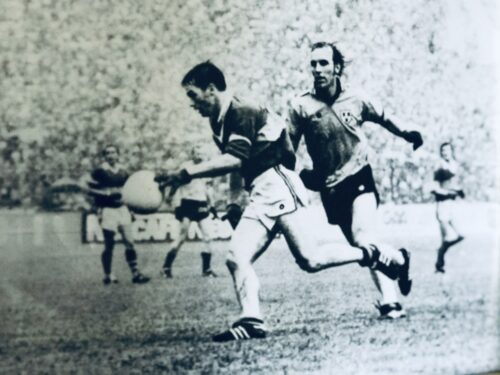
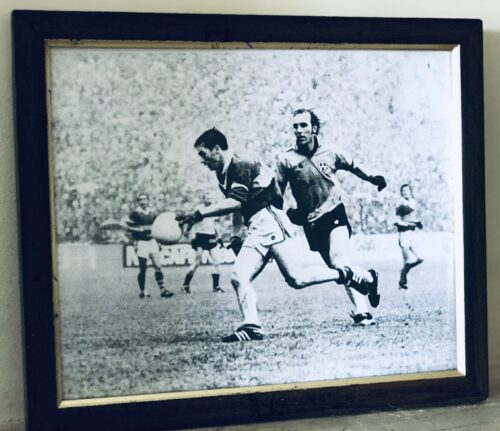 23cm x 29 cm. Baldoyle Dublin Atmospheric photo of Brian Mullins of Dublin following Paidi O Se of Kerry on a rain sodden Croke Park in 1978 Con’s description of Kerry player Mikey Sheehy’s free in the 1978 All Ireland Football Final between Dublin v Kerry is still the stuff of legend and is worth quoting again. Con wrote: “Dublin were like climbers who had been driven down the mountain by a rock fall – they had to set out again from the plateau not far from the base. And now came the moment that will go into that department of sport’s museum where abide such strange happenings as the Long Count and the goal that gave Cardiff their only English FA Cup and the fall of Devon Loch. Its run-up began with a free from John O’Keefe, deep in his own territory. Jack O’Shea made a flying catch and drove a long ball towards the middle of the 21 -yard line. Mikey Sheehy’s fist put it behind the backs, breaking along the ground out toward Kerry’s right. This time Paddy Cullen was better positioned and comfortably played the ball with his feet away from Sheehy. He had an abundance of time and space in which to lift and clear but his pick-up was a dubious one and the referee Seamus Aldridge, decided against him. Or maybe he deemed his meeting with Ger Power illegal. Whatever the reason, Paddy put on a show of righteous indignation that would get him a card from Equity, throwing his hands to heaven as the referee kept pointing towards goal. And while all that was going on, Mikey Sheehy was running up to take the kick-and suddenly Paddy dashed back towards his goal like a woman who smells a cake burning. The ball won the race and it curled inside the near post as Paddy crashed into the outside of the net and lay against it like a fireman who returned to find his own station ablaze. Sometime, Noel Pearson might make a musical of this amazing final and as the green flag goes up for that crazy goal he will have a banshee crooning: “And that was the end of poor Molly Malone.” And so it was. A few minutes later came the tea-break. Kerry went into a frenzy of green and gold and a tumult of acclaim. The champions looked like men who worked hard and seen their savings plundered by bandits.” .
23cm x 29 cm. Baldoyle Dublin Atmospheric photo of Brian Mullins of Dublin following Paidi O Se of Kerry on a rain sodden Croke Park in 1978 Con’s description of Kerry player Mikey Sheehy’s free in the 1978 All Ireland Football Final between Dublin v Kerry is still the stuff of legend and is worth quoting again. Con wrote: “Dublin were like climbers who had been driven down the mountain by a rock fall – they had to set out again from the plateau not far from the base. And now came the moment that will go into that department of sport’s museum where abide such strange happenings as the Long Count and the goal that gave Cardiff their only English FA Cup and the fall of Devon Loch. Its run-up began with a free from John O’Keefe, deep in his own territory. Jack O’Shea made a flying catch and drove a long ball towards the middle of the 21 -yard line. Mikey Sheehy’s fist put it behind the backs, breaking along the ground out toward Kerry’s right. This time Paddy Cullen was better positioned and comfortably played the ball with his feet away from Sheehy. He had an abundance of time and space in which to lift and clear but his pick-up was a dubious one and the referee Seamus Aldridge, decided against him. Or maybe he deemed his meeting with Ger Power illegal. Whatever the reason, Paddy put on a show of righteous indignation that would get him a card from Equity, throwing his hands to heaven as the referee kept pointing towards goal. And while all that was going on, Mikey Sheehy was running up to take the kick-and suddenly Paddy dashed back towards his goal like a woman who smells a cake burning. The ball won the race and it curled inside the near post as Paddy crashed into the outside of the net and lay against it like a fireman who returned to find his own station ablaze. Sometime, Noel Pearson might make a musical of this amazing final and as the green flag goes up for that crazy goal he will have a banshee crooning: “And that was the end of poor Molly Malone.” And so it was. A few minutes later came the tea-break. Kerry went into a frenzy of green and gold and a tumult of acclaim. The champions looked like men who worked hard and seen their savings plundered by bandits.” . -
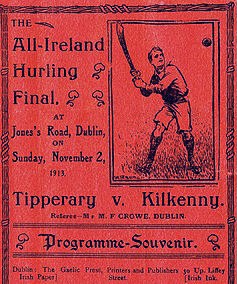
 45cm x 35cm Thurles Co Tipperary The 1913 All-Ireland Senior Hurling Championship Final was the 26th All-Ireland Final and the culmination of the 1913 All-Ireland Senior Hurling Championship, an inter-county hurling tournament for the top teams in Ireland. The match was held at Croke Park, Dublin, on 2 November 1913, between Kilkenny, represented by a club side from Mooncoin, and Tipperary, represented by club side Toomevara. The Munster champions lost to their Leinster opponents on a score line of 2–4 to 1–2.
45cm x 35cm Thurles Co Tipperary The 1913 All-Ireland Senior Hurling Championship Final was the 26th All-Ireland Final and the culmination of the 1913 All-Ireland Senior Hurling Championship, an inter-county hurling tournament for the top teams in Ireland. The match was held at Croke Park, Dublin, on 2 November 1913, between Kilkenny, represented by a club side from Mooncoin, and Tipperary, represented by club side Toomevara. The Munster champions lost to their Leinster opponents on a score line of 2–4 to 1–2.Summary
J. Murphy opened the scoring with a goal for Tipperary and Matt Gargan replied with a Kilkenny goal. Kilkenny's vital second goal was scored by Sim Walton. It was Kilkenny's third All-Ireland title in-a-row and a remarkable seventh All-Ireland title in ten championship seasons. It was also the first all-Ireland final in which teams of 15 took part. A matchday programme from the game sold at auction in Kilkenny for more than €2,000 in 2018.Details
-
Out of stock
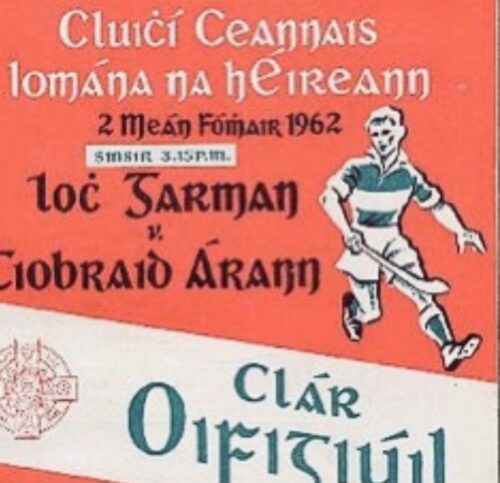
 45cm x 35cm Tipperary and Kilkenny met for the fourth successive year in the Minor final, with Kilkenny completing their third victory in a row. For the Senior match, Tipperary (captained by legend Jimmy Doyle) were looking to avenge their shock defeat when they last met Wexford (led in 1962 by Billy Rackard) in the 1960 All-Ireland. Dignitaries present to witness the final included: President of Ireland, Éamon de Valera, Former President Seán T O Kelly, An Taoiseach Seán Lemass, Minister of Industry and Commerce, former Cork hurling star Jack Lynch, and renowned actor Noel Purcell. Tipperary started explosively with two goals from Tom Moloughney and Theo English. Padge Keogh scored Wexford’s first point and they eventually clawed back into contention with Ned Wheeler drawing them level with a goal and a point. However, Tipperary went in at half time three points ahead with scores from Jimmy Doyle and Seán McLoughlin and it could have been more only due to the great goalkeeping display by Wexford’s Pat Nolan. The second half was tense and tough with Wexford drawing level again with Jimmy O Brien scoring a goal and Billy Rackard drawing them level. The sides were level three more times in a keenly fought encounter. Jimmy Doyle was a big loss to Tipperary having to go off injured, however a goal from the substitute Liam Connolly and points from Donie Nealon and Seán McLoughlin meant that Tipperary just pulled ahead and took the title by a two-point margin. Tony Wall deputised for the injured Tipperary captain and accepted the Liam McCarthy Cup.
45cm x 35cm Tipperary and Kilkenny met for the fourth successive year in the Minor final, with Kilkenny completing their third victory in a row. For the Senior match, Tipperary (captained by legend Jimmy Doyle) were looking to avenge their shock defeat when they last met Wexford (led in 1962 by Billy Rackard) in the 1960 All-Ireland. Dignitaries present to witness the final included: President of Ireland, Éamon de Valera, Former President Seán T O Kelly, An Taoiseach Seán Lemass, Minister of Industry and Commerce, former Cork hurling star Jack Lynch, and renowned actor Noel Purcell. Tipperary started explosively with two goals from Tom Moloughney and Theo English. Padge Keogh scored Wexford’s first point and they eventually clawed back into contention with Ned Wheeler drawing them level with a goal and a point. However, Tipperary went in at half time three points ahead with scores from Jimmy Doyle and Seán McLoughlin and it could have been more only due to the great goalkeeping display by Wexford’s Pat Nolan. The second half was tense and tough with Wexford drawing level again with Jimmy O Brien scoring a goal and Billy Rackard drawing them level. The sides were level three more times in a keenly fought encounter. Jimmy Doyle was a big loss to Tipperary having to go off injured, however a goal from the substitute Liam Connolly and points from Donie Nealon and Seán McLoughlin meant that Tipperary just pulled ahead and took the title by a two-point margin. Tony Wall deputised for the injured Tipperary captain and accepted the Liam McCarthy Cup. -
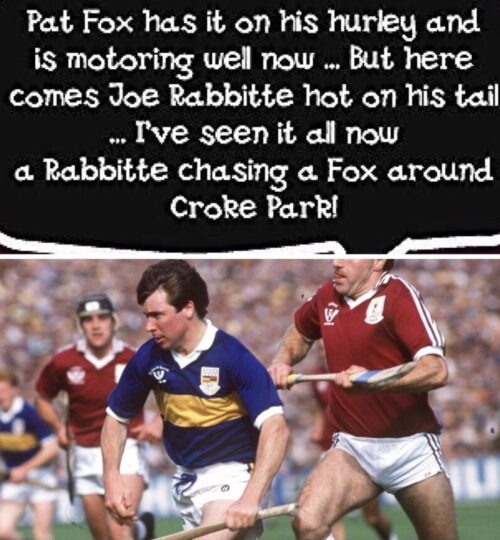
 45cm x 30cm Thurles Co Tipperary Classic commentary quote from the great Micheal O'Muircheartaigh. Micheal Ó Muircheartaigh (born 20 August 1930) is an Irish Gaelic games commentator for the Irish national radio and television, RTÉ. In a career that has spanned six decades he has come to be regarded as the "voice of Gaelic games." His prolific career has earned him a place in Guinness World Records Mícheál Ó Muircheartaigh was born in Dún Síon just outside Dingle, County Kerry in 1930.Ó Muircheartaigh grew up on the family farm and was educated locally in Dingle. In September 1945 he began studying at Coláiste Íosagáin in Baile Bhúirne in the County Cork Gaeltacht where he was in training to be a teacher. It was at this all-Irish school that his name changed from Michael Moriarty to the Irish version Mícheál Ó Muircheartaigh. In September 1948 he began the final year of his teacher training at St Patrick's College of Education in Drumcondra, Dublin.
45cm x 30cm Thurles Co Tipperary Classic commentary quote from the great Micheal O'Muircheartaigh. Micheal Ó Muircheartaigh (born 20 August 1930) is an Irish Gaelic games commentator for the Irish national radio and television, RTÉ. In a career that has spanned six decades he has come to be regarded as the "voice of Gaelic games." His prolific career has earned him a place in Guinness World Records Mícheál Ó Muircheartaigh was born in Dún Síon just outside Dingle, County Kerry in 1930.Ó Muircheartaigh grew up on the family farm and was educated locally in Dingle. In September 1945 he began studying at Coláiste Íosagáin in Baile Bhúirne in the County Cork Gaeltacht where he was in training to be a teacher. It was at this all-Irish school that his name changed from Michael Moriarty to the Irish version Mícheál Ó Muircheartaigh. In September 1948 he began the final year of his teacher training at St Patrick's College of Education in Drumcondra, Dublin.Broadcasting career
In early March 1949 Ó Muircheartaigh, along with ten other students from the college, and several from other colleges, did a test commentary on a hurling game at Croke Park. Each student had to commentate for five minutes in Irish and the most successful would be selected for further commentary work. Ó Muircheartaigh had never seen a game of hurling before in his life. But he knew that those adjudicators judging his commentary were not able to see the game:'Twas a new game to me. But I knew one person. He was in goal for UCD and his name was Tadhg Hurley. He went to school in Dingle and he had hurling because his father was a bank manager and had spent time in Tipperary or Cork. The moment my minute started, he was saving a fantastic shot. And he cleared it away out, I can still see it, out over the sideline, Cusack Stand side of the field, eighty yards out. But it was deflected out by a member of the opposition. The adjudicators couldn't see that that didn't happen. Who was called out to take the line-ball? The only person I knew, Tadhg Hurley. And he took a beautiful line-ball - Christy Ring never took better. He landed it down in front of the Railway goal, there was a dreadful foul on the full-forward, and there was a penalty. And who was called up to take the penalty? Tadhg Hurley. 'Twas the best individual display ever seen in Croke Park. It took him at least a minute to come from the Canal goal up. And while he was coming up I spoke about his brother Bob, who was in Donal's class, and his sister who used to come out to Dún Síon strand during the summer. So eventually he took the penalty. I've seen DJ Carey, I've seen Nicky Rackard, I've seen Christy Ring. None of them could ever equal the display he gave that day... Sin mar a thosaigh sé!
Ó Muircheartaigh was the one selected and his first assignment was to provide an all-Irish commentary on the 1949 Railway Cup final on St. Patrick's Day. He graduated from St. Patrick's College a little later and also completed a Bachelor of Arts degree from University College Dublin. He taught economics, accountancy and Irish in both primary and secondary schools throughout Dublin, the majority of which were run by the Christian Brothers. He continued teaching up until the 1980s, when he became a full-time broadcaster with Raidió Teilifís Éireann. For the early part of his broadcasting career Ó Muircheartaigh commentated on Minor GAA matches, in the Irish language. He also replaced the legendary Micheál O'Hehir when he was not available to commentate. Eventually when O'Hehir was forced to retire in the mid-1980s Ó Muircheartaigh took over as the station's premier radio commentator. He developed his own inimitable style of commentary and his accent is unmistakably that of a native Irish speaker. He is a true lover of Gaelic Athletic Association and it is reflected in the enthusiasm he brings to matches. His unusual turn of phrase has made him a much loved broadcaster and often imitated character. He has become particularly famous in Ireland for his unusual turns of phrase in the heat of the moment while commentating. Today he commentates on RTÉ Radio 1. In 2004 he published his autobiography, 'From Dún Sion to Croke Park'. Ó Muircheartaigh's commentaries for RTÉ Radio 1's Sunday Sport show won him a Jacob's Award in 1992. He was also the Parade Grand Marshal for the 2007 St. Patrick's Festival, having been given the honour by the chairman of the Festival in recognition and appreciation of his unique contribution to Irish culture. He will be the Parade Grand Marshal for the 2011 St. Patrick's Parade in Toronto, Ontario, Canada, also in recognition and appreciation of his unique contribution to Irish culture. On 16 September 2010 he announced his retirement from broadcasting. The last All-Ireland he commentated on was the 2010 All-Ireland Senior Football Championship Final on 19 September 2010.On 29 October 2010 it was announced that the 2nd International Rules test at Croke Park would be Ó Muircheartaigh's final broadcast as commentator on RTÉ Radio 1. On 30 October 2010 Micheál commentated his final commentary alongside RTÉ's pundit and former Meath footballer Bernard Flynn. He is contracted to officiate at the 2011–12 Volvo Ocean Race finish in Galway when he will commentate on the finish to the round the world race, to give it a uniquely Irish conclusion. Sailing has been a long time hobby of O Muircheartaigh. Ó Muircheartaigh writes a weekly sports column for Foinse, the Irish-language newspaper free with the Irish Independent each Wednesday. Ó Muircheartaigh was invited to read out a piece in Irish and in English at an event called "Laochra" in Croke Park on 24 April 2016 to commemorate the 100th anniversary of the Easter Rising.Other media
He is the main commentator in the 2005 video game Gaelic Games: Football for the PlayStation 2 and its 2007 sequel He was featured in the video "Mícheál Ó Muircheartaigh - Making a ham sandwich" which was posted on a Reddit forum, noting his "relaxing" voice.Honours
Mícheál was awarded an honorary doctorate by NUI Galway in 1999 for his lifetime service to broadcasting. -
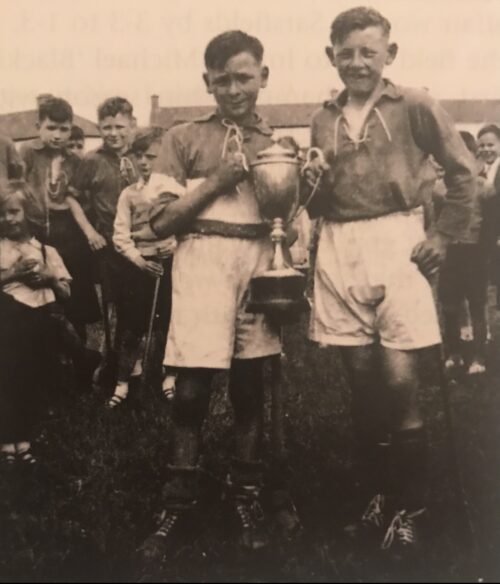
 Fantastic piece of Tipperary Hurling Nostalgia here as we see a very young Jimmy Doyle being presented with a Thurles Schoolboys Streel League Trophy. 45cm x 35cm. Thurles Co Tipperary "Jimmy Doyle would have seen many things, and watched a lot of hurling, in his 76 years. But the Tipperary legend, who died last Monday, was possibly most pleased to watch the sumptuous performance of his native county, against Limerick, just the day before. Simply put, the way Tipp hurl at the moment is pure Jimmy Doyle - and no finer compliment can be paid in the Premier County. Eamon O'Shea's current group are all about skill, vision, élan, creativity, elegance: the very things which defined Doyle's playing style as he terrorised defences for close on two decades. Indeed, it's a funny irony that the Thurles Sarsfields icon, were he young today, would easily slip into the modern game, such was his impeccable technique, flair and positional sense. There may have been "better" hurlers in history (Cork's Christy Ring surely still stands as the greatest of all). There may even have been better Tipp hurlers - John Doyle, for example, who won more All-Irelands than his namesake. But there was hardly a more naturally gifted man to play in 125 years. The hurling of Doyle's heyday, by contrast with today, was rough, tough, sometimes brutal. His own Tipp team featured a full-back line so feared for taking no prisoners, they were christened (not entirely unaffectionately) "Hell's Kitchen". While not quite unique, Doyle was one of a select group back then who relied less on brute force, and more on quick wrists, "sixth sense" spatial awareness, and uncanny eye-hand co-ordination to overcome. During the 1950s and '60s, when he was in his pomp, forwards were battered, bruised and banjaxed, with little protection from rules or referees. It speaks even more highly, then, of this small, slim man ("no bigger in stature than a jockey", as put by Irish Independent sportswriter Vincent Hogan) that he should achieve such greatness. What, you'd wonder, might have been his limitations - if any - had he played in the modern game? Regardless, his place in hurling's pantheon is assured; one of a handful of players to transcend even greatness and enter some almost supernatural realm of brilliance. This week his former teammate, and fellow Tipp legend, Michael "Babs" Keating recalled how Christy Ring had once told him, "If Jimmy Doyle was as strong as you and I, nobody would ever ask who was the best." Like Ring, Jimmy made both the 1984 hurling Team of the Century, compiled in honour of the GAA's Centenary, and the later Team of the Millennium. We can also throw in a slot on both Tipperary and Munster Teams of the Millennium, and being named Hurler of the Year in 1965 - and that's just the start of one of the most glittering collections of honours in hurling history.
Fantastic piece of Tipperary Hurling Nostalgia here as we see a very young Jimmy Doyle being presented with a Thurles Schoolboys Streel League Trophy. 45cm x 35cm. Thurles Co Tipperary "Jimmy Doyle would have seen many things, and watched a lot of hurling, in his 76 years. But the Tipperary legend, who died last Monday, was possibly most pleased to watch the sumptuous performance of his native county, against Limerick, just the day before. Simply put, the way Tipp hurl at the moment is pure Jimmy Doyle - and no finer compliment can be paid in the Premier County. Eamon O'Shea's current group are all about skill, vision, élan, creativity, elegance: the very things which defined Doyle's playing style as he terrorised defences for close on two decades. Indeed, it's a funny irony that the Thurles Sarsfields icon, were he young today, would easily slip into the modern game, such was his impeccable technique, flair and positional sense. There may have been "better" hurlers in history (Cork's Christy Ring surely still stands as the greatest of all). There may even have been better Tipp hurlers - John Doyle, for example, who won more All-Irelands than his namesake. But there was hardly a more naturally gifted man to play in 125 years. The hurling of Doyle's heyday, by contrast with today, was rough, tough, sometimes brutal. His own Tipp team featured a full-back line so feared for taking no prisoners, they were christened (not entirely unaffectionately) "Hell's Kitchen". While not quite unique, Doyle was one of a select group back then who relied less on brute force, and more on quick wrists, "sixth sense" spatial awareness, and uncanny eye-hand co-ordination to overcome. During the 1950s and '60s, when he was in his pomp, forwards were battered, bruised and banjaxed, with little protection from rules or referees. It speaks even more highly, then, of this small, slim man ("no bigger in stature than a jockey", as put by Irish Independent sportswriter Vincent Hogan) that he should achieve such greatness. What, you'd wonder, might have been his limitations - if any - had he played in the modern game? Regardless, his place in hurling's pantheon is assured; one of a handful of players to transcend even greatness and enter some almost supernatural realm of brilliance. This week his former teammate, and fellow Tipp legend, Michael "Babs" Keating recalled how Christy Ring had once told him, "If Jimmy Doyle was as strong as you and I, nobody would ever ask who was the best." Like Ring, Jimmy made both the 1984 hurling Team of the Century, compiled in honour of the GAA's Centenary, and the later Team of the Millennium. We can also throw in a slot on both Tipperary and Munster Teams of the Millennium, and being named Hurler of the Year in 1965 - and that's just the start of one of the most glittering collections of honours in hurling history. -
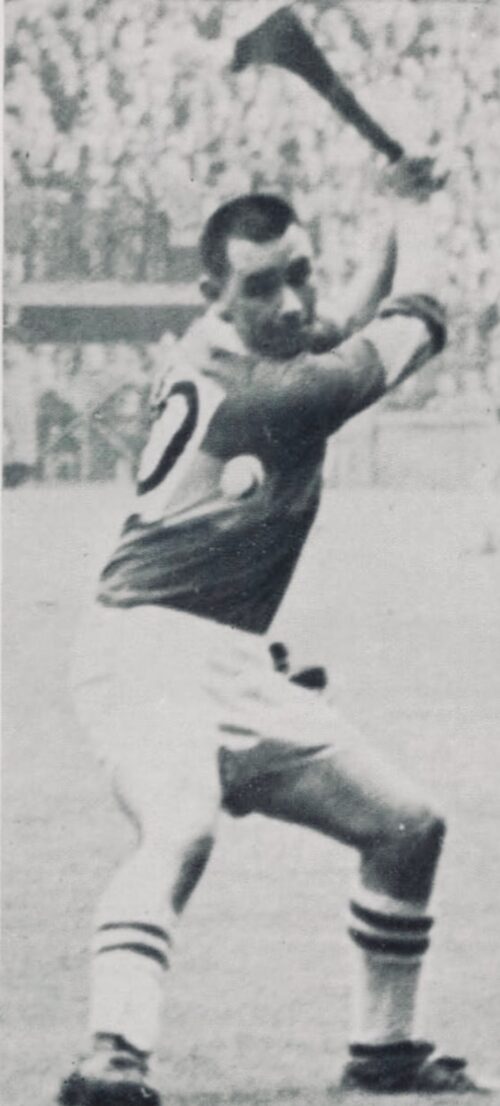
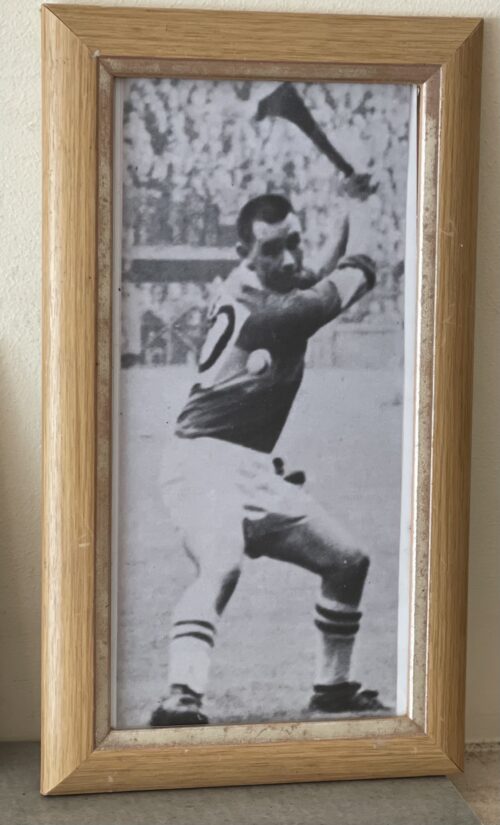 20cm x 35cm. Thurles Co Tipperary "Jimmy Doyle would have seen many things, and watched a lot of hurling, in his 76 years. But the Tipperary legend, who died last Monday, was possibly most pleased to watch the sumptuous performance of his native county, against Limerick, just the day before. Simply put, the way Tipp hurl at the moment is pure Jimmy Doyle - and no finer compliment can be paid in the Premier County. Eamon O'Shea's current group are all about skill, vision, élan, creativity, elegance: the very things which defined Doyle's playing style as he terrorised defences for close on two decades. Indeed, it's a funny irony that the Thurles Sarsfields icon, were he young today, would easily slip into the modern game, such was his impeccable technique, flair and positional sense. There may have been "better" hurlers in history (Cork's Christy Ring surely still stands as the greatest of all). There may even have been better Tipp hurlers - John Doyle, for example, who won more All-Irelands than his namesake. But there was hardly a more naturally gifted man to play in 125 years. The hurling of Doyle's heyday, by contrast with today, was rough, tough, sometimes brutal. His own Tipp team featured a full-back line so feared for taking no prisoners, they were christened (not entirely unaffectionately) "Hell's Kitchen". While not quite unique, Doyle was one of a select group back then who relied less on brute force, and more on quick wrists, "sixth sense" spatial awareness, and uncanny eye-hand co-ordination to overcome. During the 1950s and '60s, when he was in his pomp, forwards were battered, bruised and banjaxed, with little protection from rules or referees. It speaks even more highly, then, of this small, slim man ("no bigger in stature than a jockey", as put by Irish Independent sportswriter Vincent Hogan) that he should achieve such greatness. What, you'd wonder, might have been his limitations - if any - had he played in the modern game? Regardless, his place in hurling's pantheon is assured; one of a handful of players to transcend even greatness and enter some almost supernatural realm of brilliance. This week his former teammate, and fellow Tipp legend, Michael "Babs" Keating recalled how Christy Ring had once told him, "If Jimmy Doyle was as strong as you and I, nobody would ever ask who was the best." Like Ring, Jimmy made both the 1984 hurling Team of the Century, compiled in honour of the GAA's Centenary, and the later Team of the Millennium. We can also throw in a slot on both Tipperary and Munster Teams of the Millennium, and being named Hurler of the Year in 1965 - and that's just the start of one of the most glittering collections of honours in hurling history.
20cm x 35cm. Thurles Co Tipperary "Jimmy Doyle would have seen many things, and watched a lot of hurling, in his 76 years. But the Tipperary legend, who died last Monday, was possibly most pleased to watch the sumptuous performance of his native county, against Limerick, just the day before. Simply put, the way Tipp hurl at the moment is pure Jimmy Doyle - and no finer compliment can be paid in the Premier County. Eamon O'Shea's current group are all about skill, vision, élan, creativity, elegance: the very things which defined Doyle's playing style as he terrorised defences for close on two decades. Indeed, it's a funny irony that the Thurles Sarsfields icon, were he young today, would easily slip into the modern game, such was his impeccable technique, flair and positional sense. There may have been "better" hurlers in history (Cork's Christy Ring surely still stands as the greatest of all). There may even have been better Tipp hurlers - John Doyle, for example, who won more All-Irelands than his namesake. But there was hardly a more naturally gifted man to play in 125 years. The hurling of Doyle's heyday, by contrast with today, was rough, tough, sometimes brutal. His own Tipp team featured a full-back line so feared for taking no prisoners, they were christened (not entirely unaffectionately) "Hell's Kitchen". While not quite unique, Doyle was one of a select group back then who relied less on brute force, and more on quick wrists, "sixth sense" spatial awareness, and uncanny eye-hand co-ordination to overcome. During the 1950s and '60s, when he was in his pomp, forwards were battered, bruised and banjaxed, with little protection from rules or referees. It speaks even more highly, then, of this small, slim man ("no bigger in stature than a jockey", as put by Irish Independent sportswriter Vincent Hogan) that he should achieve such greatness. What, you'd wonder, might have been his limitations - if any - had he played in the modern game? Regardless, his place in hurling's pantheon is assured; one of a handful of players to transcend even greatness and enter some almost supernatural realm of brilliance. This week his former teammate, and fellow Tipp legend, Michael "Babs" Keating recalled how Christy Ring had once told him, "If Jimmy Doyle was as strong as you and I, nobody would ever ask who was the best." Like Ring, Jimmy made both the 1984 hurling Team of the Century, compiled in honour of the GAA's Centenary, and the later Team of the Millennium. We can also throw in a slot on both Tipperary and Munster Teams of the Millennium, and being named Hurler of the Year in 1965 - and that's just the start of one of the most glittering collections of honours in hurling history. -
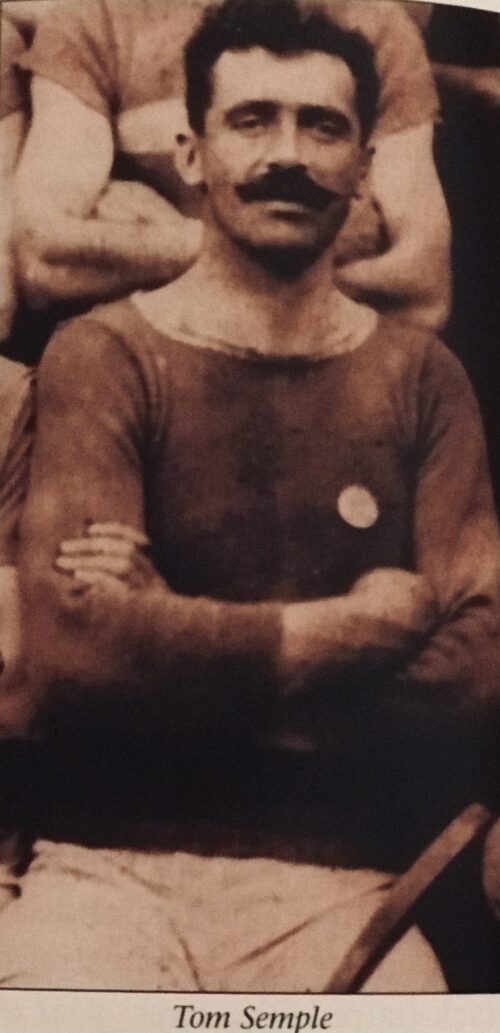
 45cm x 35cm Thurles Co Tipperary Thomas Semple (8 April 1879 – 11 April 1943) was an Irish hurler who played as a half-forward for the Tipperary senior team. Semple joined the panel during the 1897 championship and eventually became a regular member of the starting seventeen until his retirement after the 1909 championship. During that time he won three All-Ireland medals and four Munster medals. An All-Ireland runner-up on one occasion, Semple captained the team to the All-Ireland title in 1906 and in 1908. At club level Semple was a six-time county club championship medalist with Thurles.
45cm x 35cm Thurles Co Tipperary Thomas Semple (8 April 1879 – 11 April 1943) was an Irish hurler who played as a half-forward for the Tipperary senior team. Semple joined the panel during the 1897 championship and eventually became a regular member of the starting seventeen until his retirement after the 1909 championship. During that time he won three All-Ireland medals and four Munster medals. An All-Ireland runner-up on one occasion, Semple captained the team to the All-Ireland title in 1906 and in 1908. At club level Semple was a six-time county club championship medalist with Thurles.Playing career
Club
Semple played his club hurling with the local club in Thurles, the precursor to the famous Sarsfield's club. He rose through the club and served as captain of the team for almost a decade. In 1904 Semple won his first championship medal following a walkover from Lahorna De Wets. Thurles failed to retain their title, however, the team returned to the championship decider once again in 1906. A 4-11 to 3-6 defeat of Lahorna De Wets gave Semple his second championship medal as captain. It was the first of four successive championships for Thurles as subsequent defeats of Lahorna De Wets, Glengoole and Racecourse/Grangemockler brought Semple's medal tally to five. Five-in-a-row proved beyond Thurles, however, Semple's team reached the final for the sixth time in eight seasons in 1911. A 4-5 to 1-0 trouncing of Toomevara gave Semple his sixth and final championship medal as captain.Inter-county
Semple's skill quickly brought him to the attention of the Tipperary senior hurling selectors. After briefly joining the team in 1897, he had to wait until 1900 to become a regular member of the starting seventeen. That year a 6-11 to 1-9 trouncing of Kerry gave him his first Munster medal.Tipp later narrowly defeated Kilkenny in the All-Ireland semi-final before trouncing Galway in the "home" All-Ireland final. This was not the end of the championship campaign because, for the first year ever, the "home" finalists had to take on London in the All-Ireland decider. The game was a close affair with both sides level at five points with eight minutes to go. London then took the lead; however, they later conceded a free. Tipp's Mikey Maher stepped up, took the free and a forward charge carried the sliotar over the line. Tipp scored another goal following a weak puck out and claimed a 2-5 to 0-6 victory. It was Semple's first All-Ireland medal. Cork dominated the provincial championship for the next five years; however, Tipp bounced back in 1906. That year Semple was captain for the first time as Tipp foiled Cork's bid for an unprecedented sixth Munster title in-a-row. The score line of 3-4 to 0-9 gave Semple a second Munster medal. Tipp trounced Galway by 7-14 to 0-2 on their next outing, setting up an All-Ireland final meeting with Dublin. Semple's side got off to a bad start with Dublin's Bill Leonardscoring a goal after just five seconds of play. Tipp fought back with Paddy Riordan giving an exceptional display of hurling and capturing most of his team's scores. Ironically, eleven members of the Dublin team hailed from Tipperary. The final score of 3-16 to 3-8 gave victory to Tipperary and gave Semple a second All-Ireland medal. Tipp lost their provincial crown in 1907, however, they reached the Munster final again in 1908. Semple was captain of the side again that year as his team received a walkover from Kerry in the provincial decider. Another defeat of Galway in the penultimate game set up another All-Ireland final meeting with Dublin. That game ended in a 2-5 to 1-8 draw and a replay was staged several months later in Athy. Semple's team were much sharper on that occasion. A first-half goal by Hugh Shelly put Tipp well on their way. Two more goals by Tony Carew after the interval gave Tipp a 3-15 to 1-5 victory.It was Semple's third All-Ireland medal. 1909 saw Tipp defeat arch rivals Cork in the Munster final once again. A 2-10 to 1-6 victory gave Semple his fourth Munster medal. The subsequent All-Ireland final saw Tipp take on Kilkenny. The omens looked good for a Tipperary win. It was the county's ninth appearance in the championship decider and they had won the previous eight. All did not go to plan as this Kilkenny side cemented their reputation as the team of the decade. A 4-6 to 0-12 defeat gave victory to "the Cats" and a first final defeat to Tipperary. Semple retired from inter-county hurling following this defeat.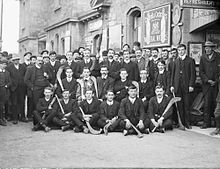 Tipperary Hurling Team outside Clonmel railway station, August 26, 1910. Semple is in the centre of the middle row.
Tipperary Hurling Team outside Clonmel railway station, August 26, 1910. Semple is in the centre of the middle row.Personal life
Semple was born in Drombane, County Tipperary in 1879. He received a limited education at his local national school and, like many of his contemporaries, finding work was a difficult prospect. At the age of 16 Semple left his native area and moved to Thurles. Here he worked as a guardsman with the Great Southern & Western Railway. In retirement from playing Semple maintained a keen interest in Gaelic games. In 1910 he and others organised a committee which purchased the showgrounds in Thurles in an effort to develop a hurling playing field there. This later became known as Thurles Sportsfield and is regarded as one of the best surfaces for hurling in Ireland. In 1971 it was renamed Semple Stadium in his honour. The stadium is also lovingly referred to as Tom Semple's field. Semple also held the post of chairman of the Tipperary County Board and represented the Tipperary on the Munster Council and Central Council. He also served as treasurer of the latter organization. During the War of Independence Semple played an important role for Republicans. He organized dispatches via his position with the Great Southern & Western Railway in Thurles. Tom Semple died on 11 April 1943.

